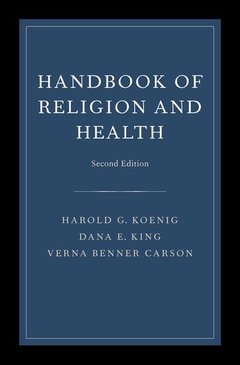Description
Handbook of Religion and Health (2nd Ed.)
Authors: Koenig Harold, King Dana, Carson Verna B.
Language: English
Subjects for Handbook of Religion and Health:
305.12 €
In Print (Delivery period: 21 days).
Add to cart
Publication date: 03-2012
1192 p. · 25.4x19.1 cm · Hardback
1192 p. · 25.4x19.1 cm · Hardback
Description
/li>Contents
/li>Biography
/li>
The Handbook of Religion and Health has become the seminal research text on religion, spirituality, and health, outlining a rational argument for the connection between religion and health. The Second Edition completely revises and updates the first edition. Its authors are physicians: a psychiatrist and geriatrician, a primary care physician, and a psychiatrist and theologian, all with advanced degrees in epidemiology and public health. The Second Edition surveys the historical connections between religion and health and grapples with the distinction between the terms ''religion'' and ''spirituality'' in research and clinical practice. It reviews research on religion and mental health, as well as extensive research literature on the mind-body relationship, and develops a model to explain how religious involvement may impact physical health through the mind-body mechanisms. It also explores the direct relationships between religion and physical health, covering such topics as immune and endocrine function, heart disease, hypertension and stroke, neurological disorders, cancer, and infectious diseases; and examines the consequences of illness including chronic pain, disability, and quality of life. Finally, the Handbook reviews research methods and addresses applications to clinical practice. Theological perspectives are interwoven throughout the chapters. The Handbook is the most insightful and authoritative resource available to anyone who wants to understand the relationship between religion and health.
Foreword (Linda George). Preface (Jeff Levin). Introduction. I. Background. 1. A history of religion, medicine, and health care. 2. Definitions. II. Debating religion's effects on health. 3. Religion: good or bad?. 4. Coping with stress. 5. Religion and coping. III. Research on religion and mental health. 6. Well-being. 7. Depression. 8. Suicide. 9. Anxiety. 10. Psychotic disorders. 11. Alcohol and drug use. 12. Delinquency. 13. Marital instability. 14. Personality and personality disorder. 15. Understanding religion's effects on mental health. IV. Research on religion and physical health. 16. Heart disease. 17. Hypertension. 18. Cerebrovascular disease. 19. Alzheimer's disease and dementia. 20. Immune system. 21. Endocrine system. 22. Cancer 23. Mortality 24. Physical disability 25. Pain and somatic symptoms. 26. Health behaviors. 27. Disease prevention. V. Understanding the religion-physical health relationship. 28. Psychological, social, and behavioral pathways. 29. Conclusions. Appendix. Studies on religion and health (by health outcome). References. Index.
Harold G. Koenig is professor of psychiatry and behavioral sciences and assiciate professor of medicine at Duke University Medical Center, and is a distinguished adjunct professor at King Abdulaziz University in Jeddah, Saudi Arabia. He is director of Duke University's Center for Spirituality, Theology and Health in Durham, North Carolina. Dana E. King is professor of family medicine and vice chair of the Department of Family Medicine at the Medical University of South Carolina in Charleston, South Carolina. Verna Benner Carson is associate professor of nursing at Towson University in Fallston, Maryland.
© 2024 LAVOISIER S.A.S.




